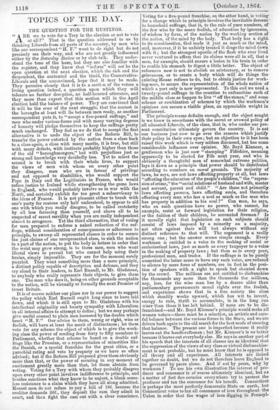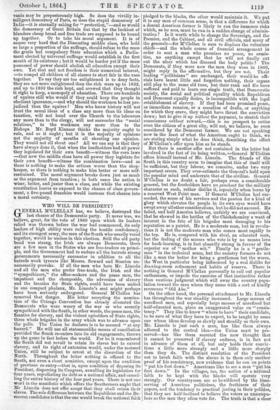puzzled. They want something more than a mere principle, numerical
the latter cease to have any such voice, are reduced a distinct policy capable of description and defence, and they to silence by mere force of numbers, are in fact in the posi- cry aloud to their leaders, to Earl Russell, to Mr. Gladstone, tion of speakers with a right to speak but shouted down to anybody who really represents their objects, to give them by the crowd. The millions are not entitled to disfranchise one. The man who does it, being on other grounds acceptable the thousands any more than the thousands the millions, to the nation, will be virtually or formally the next Premier of nay, less for the wise man has by a decree older than Great Britain. parliamentary governments moral rights over the foolish, It is of course neither our place nor in our power to suggest and experience shows that in a free society the class the policy which Earl Russell ought long since to have laid which steadily works upward, which has wit to invent, down, and which it is still open to Mr. Gladstone with his energy to rule, thrift to accumulate, is in the long run intellectual originality and hearty sympathy with Liberalism wiser than those it has left behind. If none are to be dis- in all internal affairs to attempt to define; but we may perhaps franchised—and Mr. Boyd Kinnear's principle would make all give useful counsel to plain men harassed by the doubts which women voters—there must be a selection, an artistic and care- beset "H. F." Our advice to them, wrong or right, wise or full balance between the various forces in the State, and we are foolish, will have at least the merit of distinctness ; let them driven back again to the old search for the best mode of creating vote for any scheme the object of which is to give the work- that balance. The present one is imperfect because it really ing class the power of sending from forty to fifty members to leaves out the handicraftsmen ; but Mr. Kinnear's is no better Parliament, whether that scheme be based on a double suf- because it leaves out everybody else. He says in another part of frage like the Prussian, or a representation of minorities like his speech that the interests of all classes are so identical that the Danish, or a special franchise for the great cities, or a the suppression of the views of any class or virtual disfranchise- parochial rating and vote by property as we have so often ment is not probable, but he must know that he is opposed to advised; but if the Reform Bill proposed gives them obviously all theory and all experience. All interests are linked more than that, or the power of securing in any moment of together no doubt, but we do not therefore leave England to excitement greatly more than that, let them abstain from be governed by peers alone. And if not by peers, why by voting. 'Voting for a Tory with whom they probably disagree workmen ? To use his own illustration the interest of pro. upon every other point involves indifference to principle, and ducer and consumer is of course ultimately identical, but as besides sanctions what they know to be unjust, a blank sense- a matter of fact den.ocracies everywhere try to protect the less resistance to a claim which they have all along admitted. producer and tax the consumer for his benefit. Connecticut Honest men do not refuse to pay a bill of 101. because the is perhaps the most perfectly democratic State on earth, but creditor demands 20/., they deposit the sum they admit in Connecticut votes to tax all consumers of iron throughout the court, and then fight the case out with a clear conscience. Union in order that the wages of iron digging in Pennsyl- Voting for a five-pound franchise, on the other hand, is voting- TOPIC S OF THE DAY. for a change which in principle involves the inevitable descent to household suffrage, that is, to the rule of pure numbers, of THE QUESTION FOR THE HUSTINGS. the few wise by the many foolish, of education by ignorance, "ARE we to vote for a Tory in the election or not to vote of wisdom by force, of the nation by the working section of at all ?" That is the question addressed to us by the nation, of the mind by the body. That body has a right. thinking Liberals from all parts of the country, by men who to its consideration, God made it just as much as the mind', like onr correspondent "11. F." want to do right but do not and, moreover, if it be unfairly treated it drags the mind down precisely see their way, and who are not greatly influenced with it ; but the strongest apostle of the flesh who ever lived. either by the Saturday Review or by club talk. They under- never ventured to affirm that its claims were all in all, that rr stand the tone of the hoer, but they aro also familiar with man, for example, should ensure a lesion in his brain in order the register, and they know that "reform" will not be the to enable his stomach to digest a little better. The object of open question at the next election, which the rich and the reformers now is not to abolish an aristocracy, or to remove- despondent, the contented and the timid, the Conservative- grievances or to create a body which will do things the Liberals and the unconvinced, hope that it may be made. existing House refuses to do, but to obtain justice for work- They perceive clearly that it is to a section of the voters a ing-men, to secure the representation of the whole nation of living question indeed, a question upon which they will which a part only is now represented. To this end we need a tolerate no further deception, no half-hearted utterance, and twenty-pound suffrage in the counties to enfranchise such of they more than expect that this section will in the April the middle class as happen to live " off the stones," and some election hold the balance of power. They are convinced that scheme or combination of schemes by which the workmen's it will be the crux of the next struggle, that the contest in opinions can secure a visible place, an appreciable weight in the boroughs at least will lie between men ready, as another Parliament. correspondent puts it, to " accept a five-pound suffrage," and The principle seems definite enough, and the object sought - men who under various forms and with many varying degrees is we know in necordanee with the secret or avowed policy of of honesty will pledge themselves to keep the suffrage pretty all educated Liberals, of the class, that is, who under our pre- much unchanged. They feel as we do that to accept the first sent constitution ultimately govern the country. It is not alternative is to undo the object of the Reform Bill, to our business just now to go over the reasons which justify transfer the power extorted by the nation from a class back their policy in their own eyes ; but an objection to it has beex. to a class again a class with many merits, it is true, but still raised this week which is very Seldom discussed, but has some with many detects, with instincts probably higher than those considerable influence over opinion. Mr. Boyd Kinnear, a of the old " boroughmongers," but with prejudices just as gentleman who is just now "stumping" Fifeshire, meaning strong and knowledge very decidedly less. Yet to select the apparently to be elected for Fife next year, and who is. second is to break with their whole lives, to support obviously a thoughtful man of somewhat extreme politics, vania may be preposterously high. So does the vividly in- telligent democracy of Paris, so does the stupid democracy of India—it is eternally asking for " protection' "—and so would the democracy of Great Britain but that by the luckiest of blunders cheap bread and free trade are supposed to be bound
up together. Or to take his moral argument. It is of course very hard that the Dissenting middle class, who hold so large a proportion of the suffrage, should refuse to the mass the gratis but compulsory State education which a Parlia- ment elected by universal suffrage would establish in the first month of its existence ; but it would be harder yet if the mass possessed of power should abolish all education except their own. Yet that and not freedom is their numerical interest, —to compel all children of all classes to start fair in the race together. To say they are too enlightened is to deny facts, they are not more enlightened than the rich were up to 1832, and up to 1832 the rich kept, and avowed that they thought it right to keep, a monopoly of education. There are hundreds of squires still who would if they could keep the people in obedient ignorance,—and why should the workmen be less pre- judiced than the squires ? Men who know history will not trust the moral ideas of a class any more than its ideas on taxation, will not hand over the Church to the labourers any more than to the clergy, will not surrender the "social relations," to the workmen any more than to the Bishops. Mr. Boyd Kinnear thinks the majority ought to rule, and so it ought ; but it is the majority of opinions not the majority of mouths all 'shouting one opinion. They would not all shout one ? All we can say is that they have always done it, that when the landholders had all power they legislated for their own benefit—witness the corn laws —that now the middle class have all power they legislate for their own benefit—witness the combination laws—and as there is nothing to make the artizan worse than the shop- keeper, so there is nothing to make him better or more self- restrained. The moral argument breaks down just as much as the argument from taxation ; in both cases the nation is wiser, better, and juster than a class, and while the existing constitution leaves us exposed to the chance of class govern- ment, a five-pound franchise would increase that chance into a moral certainty.































 Previous page
Previous page